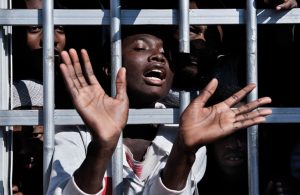
San Salvo. “C’è un dato scomparso dalla storia ufficiale, quello di coloro che in Italia hanno perso la vita a causa della detenzione forzata nei centri per immigrati. Luoghi in cui non valevano e non valgono nemmeno le garanzie dei regolamenti penitenziari, spazi pensati esclusivamente come zoo temporanei per persone”. Per cercare di colmare questa scomparsa, di raccontare una storia ormai ventennale è stato pubblicato dalla rivista Left il libro “Mai più, la vergogna italiana dei lager per immigrati”.
Appuntamento venerdì prossimo alle 19 a San Salvo per la presentazione del libro con Stefano Galieni, uno degli autori, redattore della rivista Left e attivista dell’associazione ADIF, e l’avvocato Nicholas Tomeo. L’evento è organizzato dall’Associazione Antimafie Rita Atria e da PeaceLink Abruzzo e ospitato da Molière Bistrot letterario di Marisa D’Alfonso in via Duca degli Abruzzi 37b.
Uscito nelle edicole l’11 ottobre “Mai più, la vergogna italiana dei lager per immigrati” cerca di colmare una lacuna della “democrazia” italiana. Una pubblicazione nella quale si ripercorre la storia del “Regina Pacis” di Lecce, così come il “Serraino Vulpitta” di Trapani (dove il 28 dicembre 1999 avvenne una delle peggiori tragedie di quegli anni), Via Corelli a Milano, Ponte Galerio a Roma, Gradisca D’Isonzo (ribattezzata non a caso la “Guantanamo italiana”) e tanti altri.
“Le strutture di detenzione amministrativa sono state pensate e potenziate come adeguate a garantire i confini europei e la “sicurezza interna”, ma si sono rivelati enormi voragini in cui sparivano persone, soldi pubblici e moriva lo Stato di diritto” scrive nella prefazione al libro Stefano Galieni. “Una ragione in più per parlarne con maggior cognizione di causa e per tornare a chiederne a gran voce la definitiva abolizione anche in quanto istituzioni totali dove neanche i più elementari diritti delle persone possono essere rispettate”.

![A migrant gestures from behind the bars of a cell at a detention centre in Libya, Tuesday 31 January 2017. The detention centre was constructed in 2006 following an agreement between the Italian and Libyan governments in an attempt to stem the flow of migrants reaching Italy. When UNICEF visited the centre on 31 January 2017, the population consisted of 27 women (four of whom were pregnant), one 11-month old child, a four year old, as well as 1,352 men - of which 250 were under the age of 16. The centre is at the crossroads of areas controlled by different militias fighting with each other. For this reason it is a very dangerous centre, for officers who work there and for migrants in detention. The detention centre is currently managed by the Libyan National Army, and most migrants remain there for a period of 8 to 10 months according to the manager Abdalhamad Altunisa. "Children are often alone, they cross 2000 kilometres of desert without their families, and they are rescued at sea without documents”, said Altunisia “this makes it difficult for us to know their real nationality and age. Before 2014 we brought them back to the border between Nigeria and Libya to take them back to their countries, but after the last civil war it was much more difficult. Those areas are dangerous even for us”. Migrants who were being held in the cells said they are rarely allowed out. Many of the those being held are sick, and some detainees are said to have passed away because they have no access to medical care. The director of the centre, Altunisa, said "the official government [of Sarraj] does not give us the money to pay salaries and to pay those who bring us food. So often we do not have enough food or drinking water. This winter was particularly cold and in recent weeks 15 migrants froze to death."
Libya is a country in turmoil. Since 2014 security is precarious, living is hard, and violence is commonplace. The country is riven with militias in conflict with each othe](https://abruzzolive.it/wp-content/uploads/2019/12/Libia_Veglio-770x500.jpg)

